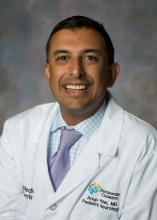At the 2020 CNS-ICNA Conjoint Meeting, held virtually this year, Anul Patel, MD, section chief of Pediatric neurology at Nationwide Children’s and associate professor of clinical pediatrics and neurology at the Ohio State University, both in Columbus, Ohio, reported 156-week results of an open-label extension trial called GWPCARE5 that showed patients with LGS taking Epidiolex had a 60% or greater average reduction in seizures, compared with baseline. Epidiolex, a highly purified form of CBD, was approved by the Food and Drug Administration in 2018 for LGS and Dravet syndrome.
In a separate presentation, Nancy A. McNamara, MD, an assistant professor at the C.S. Mott Children’s Hospital at the University of Michigan, Ann Arbor, said that more than one-third of patients taking both Epidiolex and valproic acid (VPA) developed thrombocytopenia after starting CBD therapy. The single-center chart review she reported on included 83 patients.
Daniel Friedman, MD, an epilepsy specialist at New York University who’s researched CBD in children with autism spectrum disorder, said, “These studies show that, while purified CBD has durable effects on the most disabling seizures in children and adults with LGS, like all treatments, it is not without risks that warrant attention and monitoring.”
Open-label extension study
The open-label extension study included 366 patients who participated in the two previous clinical trials. They were given varying doses of CBD titrated over 2 weeks with 20 mg/kg as the target dose, Dr. Patel said. The most common concurrent therapies they were taking were clobazam, valproate or VPA, lamotrigine, levetiracetam, and rufinamide. At weeks 145-156, 67% of patients had a 50% or greater reduction in seizures, 44% had a 75% or greater reduction, and 9% stopped having seizures altogether, Dr. Patel said.
“CBD treatment had a similar safety profile to what was observed in the completed parent randomized clinical trials,” Dr. Patel said. “Sustained reductions in drop and total seizures were observed up to the 156-week follow-up point. So these results demonstrate the potential long-term benefits of CBD treatment for patients with LGS as it relates to reduction of their seizures.”
Adverse event profiles in this analysis were similar to previous clinical trials, he noted. The three most common adverse events were diarrhea (38%), convulsion (38%) and pyrexia (34%), but high percentages of those adverse events resolved during follow-up: 78%, 80%, and 96%, respectively.
Dr. Patel also noted that 31% of patients had elevated liver enzymes (alanine aminotransferase or aspartate aminotransferase), but most of these patients – 78 of 113, or 69% – were on concomitant VPA. “Importantly, no patient met the standard criteria for severe drug-induced liver injury, known as Hy’s law,” he said.
Retention rates for patients were 81% at 1 year, 69% at 2 years and 65% at 3 years, Dr. Patel said.











